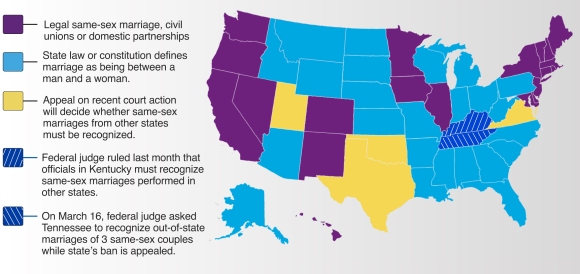 Same-sex marriage gains support in courts, public opinion
Same-sex marriage gains support in courts, public opinion
NEWS | Eric Reed
Update: Last week, Michigan became the latest state to allow same-sex marriages, after Judge Bernard Friedman overturned the state’s ban on gay marriage. About 300 couples were married before the judgment was stayed, and Michigan Governor Rick Snyder has said the state will not recognize the marriages as of now. But U.S. Attorney General Eric Holder said the government will offer federal benefits to the married couples, mirroring the action it took in Utah earlier this year.
Same-sex marriage is not being tried in the court of public opinion. It’s being tried in the courts and public opinion. And the latest evidence is it’s winning in both sectors.
Same-sex marriage is legal in 17 states. And, one way or another, it’s pending in the remaining 33.
Even in states where marriage is legally limited to one man/one woman, there is a growing sense that pending court decisions will force recognition of gay marriages performed in other states.
At the same time, new polls show a majority of Americans support recognition of same-sex marriages. The ABC News-Washington Post poll shows 59% of Americans say they support same-sex marriage (34% are opposed), and 50% say the U.S. Constitution already guarantees homosexuals the right to marry (41% say it does not).
In states that prohibit same-sex marriage, 53% of those surveyed favored allowing it; 40% remained opposed. Support for same-sex marriage is lowest among Republicans (only 40% approve), and among conservatives and evangelical Protestants at one-third or less.
The Post’s analysis of its polling is that “support for same-sex marriage has changed more rapidly than almost any social issue in the past decade.” In March 2004, only 38% of respondents said same-sex marriage should be legal, and 59% said it should not.
In all this polling, the generation gap is noteworthy. Younger people of every political and religious view were more likely to favor legalizing gay marriage. For example, a Pew survey found 61% of young Republicans under age 30 supported same-sex marriage.
The question arising in recent weeks is whether public opinion is driving the courts or if the courts are driving public opinion. And this: Have we reached the tipping point?
In six of the nation’s 11 federal appellate courts, legal challenges involving same-sex marriage are pending that could eventually go the U.S. Supreme Court.
4th Circuit, Virginia: A lower court struck down Virginia’s amendment that prevents gay couples from marrying. Opening arguments are set for the week of May 12.
5th Circuit, Texas: A Texas court ruled the state’s ban on marriages for same-sex couples was unconstitutional. The governor is appealing. No court date set.
6th Circuit, Kentucky: A federal judge ordered the state to recognize same-sex marriages performed out of state. The state attorney general refused to appeal, saying emotionally he had prayed about it and it was the right thing to do. The governor said he will use outside attorneys to appeal. No court date set.
Ohio: A federal judge ruled Ohio must recognize the out-of-state marriages of same-sex couples in the case of couples being listed as “married” on death certificates. Briefs due April 10.
7th Circuit, Illinois: A federal judge ruled same-sex couples can marry now, even before the June 1 date the state’s law takes effect. Attorney General Lisa Madigan concurred. No appeal has been announced.
9th Circuit, Nevada: The state announced it will not defend its ban on same-sex couples marrying, following the U.S. Supreme Court’s partial strike of the federal Defense of Marriage Act (DOMA). April 9 oral arguments were cancelled, will be rescheduled.
10th Circuit, Oklahoma: A federal judge ruled the state’s ban on gay marriage is unconstitutional. Oral arguments April 17.
Utah: 1,000 couples married after a federal judge ruled the state’s gay marriage ban unconstitutional, then refused to stay his ruling until an appeal could be heard. Oral arguments April 10.
And then there’s the issue of the rights of Christian service providers to refuse the business of gay couples, with the proposed Arizona law as chief example. In February, the governor refused to allow the bill, which would have protected business owners based on their religious convictions, to become law.
In all these cases, no strong Christian response seems to have arisen. The window for Christians to file suits or to urge their state governments to pursue legal action is a brief one. The cases are moving quickly to court, and no organized effort to participate, as in the early days of the pro-life movement, has materialized.
What is happening now is the waiting – waiting for one of these cases to reach the U.S. Supreme Court, and for the Court to rule on whether same-sex marriages performed in one state must be recognized in all states.
As New York Times columnist Ross Douthat concluded in a March 1 column titled “The Terms of Our Surrender”: “We are not really having an argument about same-sex marriage anymore, and on the evidence of Arizona, we’re not having a negotiation. Instead, all that’s left is the timing of the final victory – and for the defeated to find out what settlement the victors will impose.”
Eric Reed is IBSA’s associate executive director for communications and editor of the Illinois Baptist newspaper.














